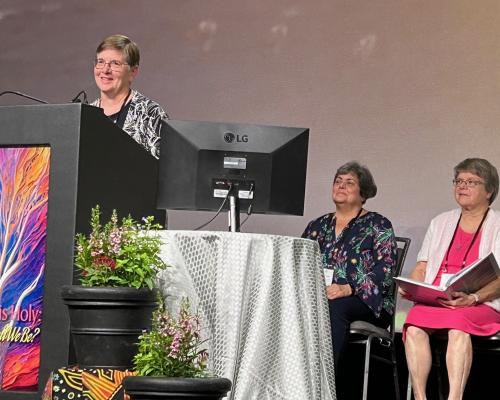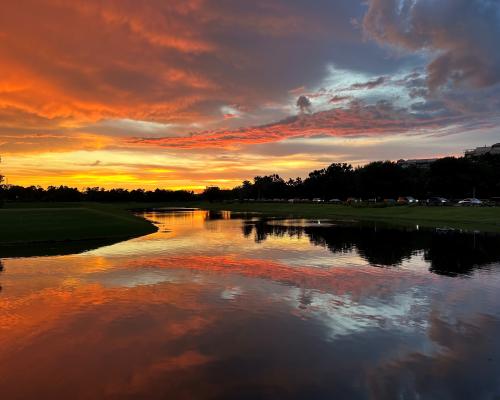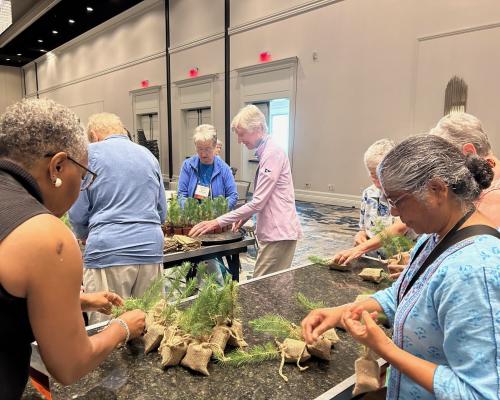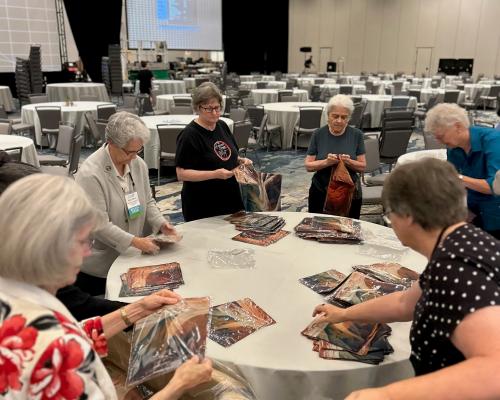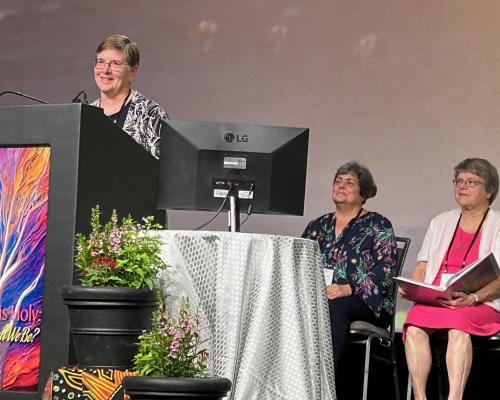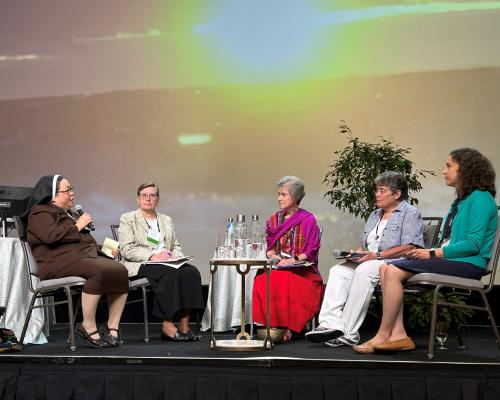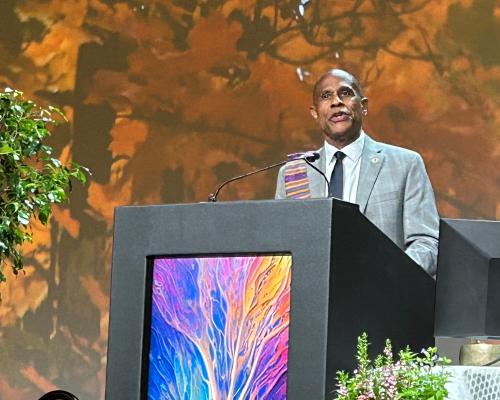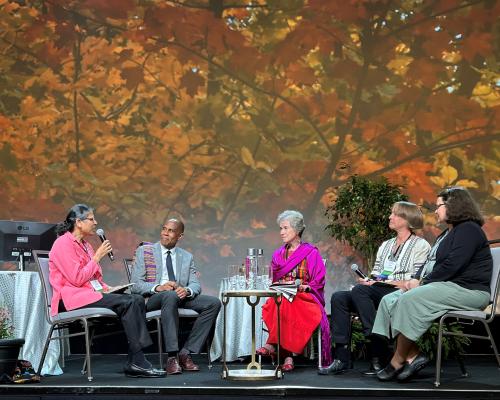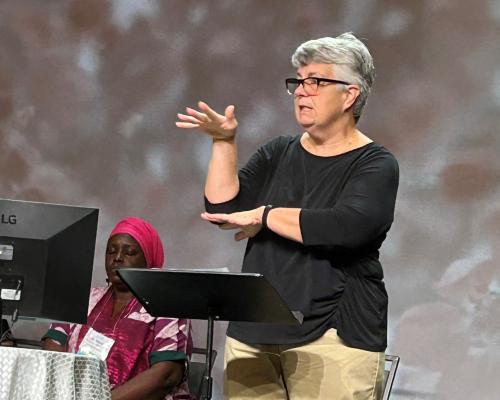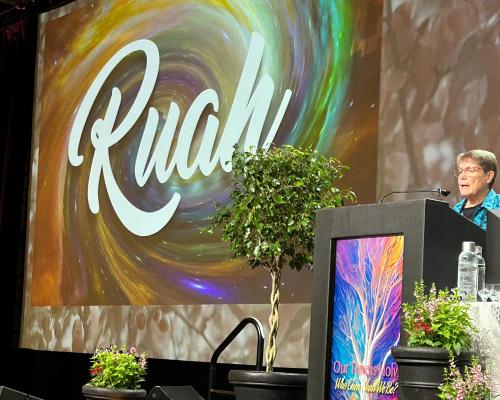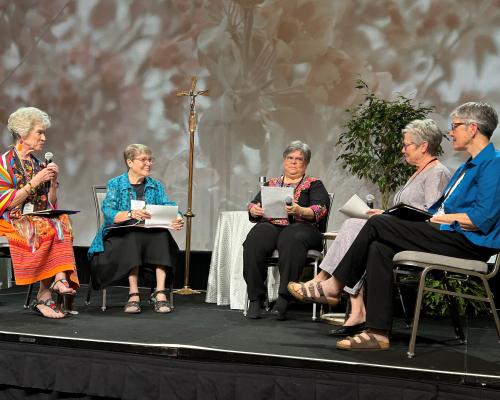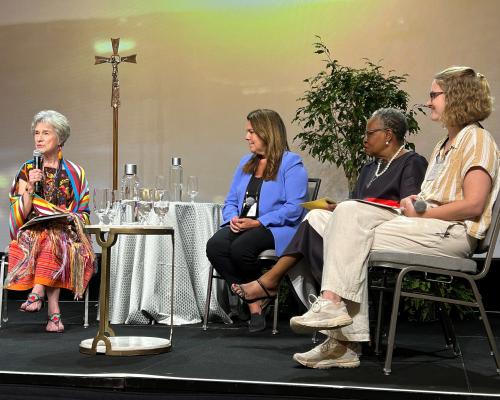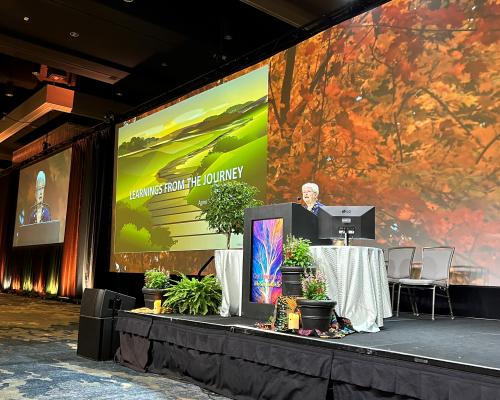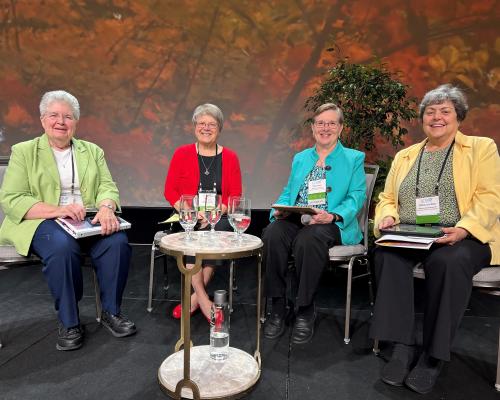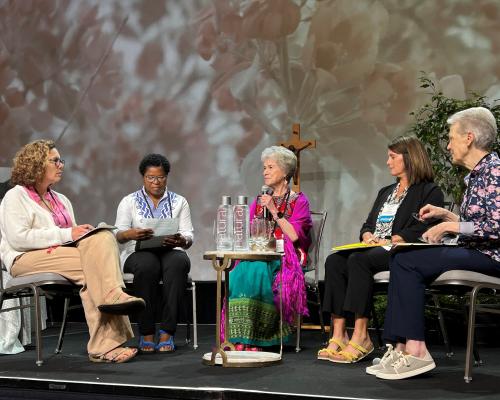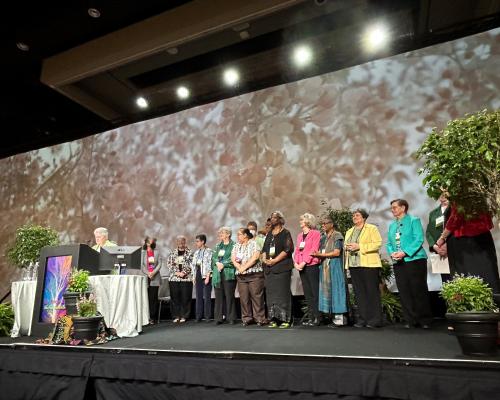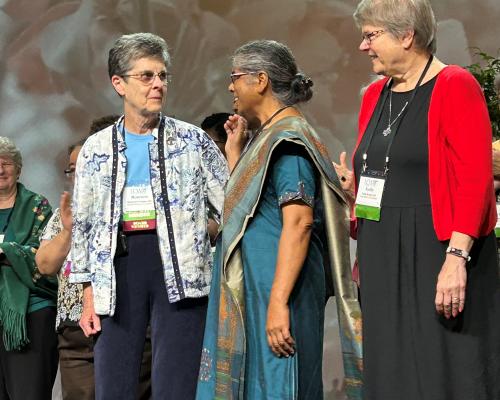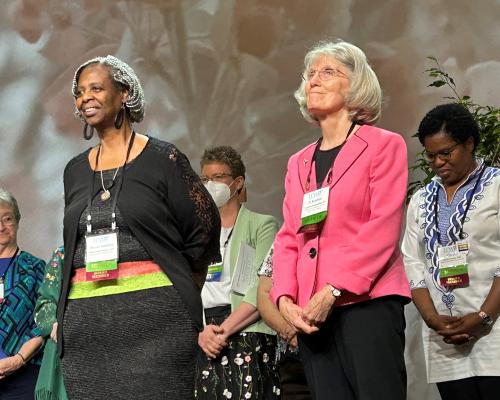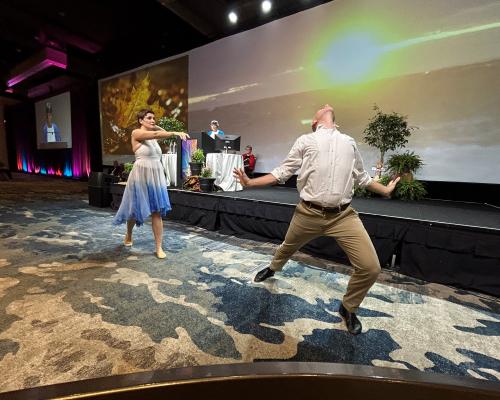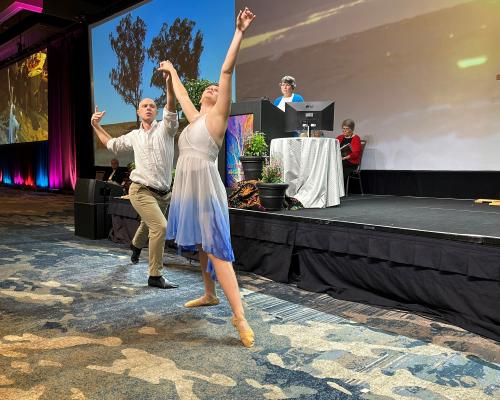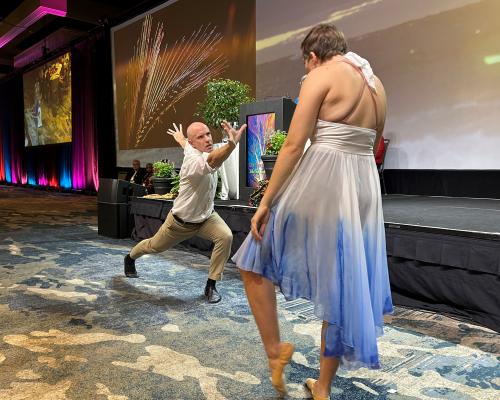Recordings and Texts in English and Spanish of the Major Events are Available Below
Summary of the 2024 Assembly
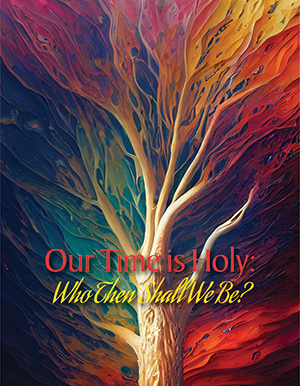
The 2024 assembly of the Leadership Conference of Women Religious (LCWR), entitled Our Time is Holy: Who Then Shall We Be?, was held in Orlando, Florida from August 13 – 16. The 753 participants, which included 505 LCWR members and 248 collaborators, took a critical look at what is happening in the world today and in religious life in order to see the compelling call to religious life at this time. The content provided the impetus for leaders to bring forth the best inside of themselves and inside their institutes so that they can be energized to respond to a world in need of what they have to bring. Participants in the assembly came from all parts of the United States and from 12 other countries.
Main speakers included Bryan N. Massingale, a priest of the Archdiocese of Milwaukee, and professor of theological and social ethics at Fordham University; and Maricarmen Bracamontes, OSB, a teacher, trained in both medicine and theological sciences, who also serves the Conference of Religious Institutes in Mexico (CIRM) and the Confederation of Latin American Religious (CLAR).
LCWR president Sister Maureen Geary, OP of Grand Rapids, Michigan explored the question of the assembly theme: “Our Time is Holy: Who Then Shall We Be?” She took participants on an expedition to explore various pathways.
She noted that LCWR will soon begin a new initiative for all members of LCWR institutes designed to discover how women religious may live into our emerging future. The question she posed is “What is our call … who are we to be?” that she hopes will be explored and contribute to a dialogue on living into this emerging future.
According to Sister Maureen, the ultimate question remains “Who then shall we be?” She remarked, “What shall we do surely has something to do with who we shall be. We shall plant seeds … and delight when new life appears. We shall use our voices and our hearts. We shall own our complicity ... demand change … be changed … be a healing presence … be a new creation.”
She urged participants to be “morsels of encouragement, life, and love for our broken world” and “nourishment for the life of the world.”
In conclusion, she encouraged members to continue the journey of discovery to uncover their collective call to be what the world most needs women religious today to be.
Rev. Bryan Massingale, in his presentation, posed the question “What does it mean to be a sign of courageous hope in a time that we do not know how to name?” He offered the question as an invitation to dialogue and communal discernment as leaders grapple with and face a world and church on the brink of unprecedented transitions and change.
He outlined how the deep transitions that grip our nation find a parallel in the dynamics of contemporary religious life. He turned to the Christian tradition of lament to share what must be done to better navigate the challenges of these times. He suggested that if women religious are to be in solidarity with the “now” of this moment they “must be a solidarity in grief, in loss, in lament as we live in this age of exponential change…” “What unites all of us in this room with the world in which we live,” he said, “is a need to lament and grieve the loss of the familiar” to prepare for the new as gift.
He suggested that women religious need to continue to lament and grieve the brokenness of our world and allow grief to inspire action for greater justice. He also encouraged women religious to teach the church how to grieve the passing of a world that must end and move gracefully into the new. Finally, he invited members to “dream in this dark time to beyond the future, to a time when you perhaps will not be.” He asked participants to ponder, “what legacy will you leave because some day we might need it?”
In concluding he noted, “…bequeathing a legacy for others to use in ways that perhaps we cannot foresee is an act of gracious opening to the new era that is struggling to be born. It provides a concrete witness of how to welcome the new as gift, and not as threat.”
In a talk prepared by Sister Maricarmen Bracamontes, OSB and delivered by Sister Pat Henry, OSB, the participants heard about radical inclusion and Christian hospitality. Sister Maricarmen believes that dedicating time to discerning dynamic cultural transition will broaden our horizons. She noted “women’s religious communities bear witness to the fact that polarization, which is based on the spread of fear, lies, hatred, and cruelty towards those who are considered a threat in their difference, can be transformed and overcome. Our words, attitudes and actions can bring the relational and egalitarian process of hospitality to life, and this is truly prophetic.”
She shared some linguistic meanings of the word “hospitality” and noted, among things, that hospitality involves risk and trust on both sides; guests and hosts discover the potential of a reciprocal relationship; and host-guest relationship goes hand in hand with the mutual recognition of the vulnerability of the host and the person received.
In addition, Sister Maricarmen shared some features of the hospitality witnessed by Jesus. His style of hospitality was open and unconditional, proclaimed in a credible and coherent way. “Our world, perhaps today more than ever, needs coherent and hospitable followers of Jesus,” she said. She also asserted that “…to live in a way of radical inclusion in the style of Jesus, perhaps a process of prayerful discernment in our communities can enlighten us, so that together we can situate ourselves in the face of emerging realities where people are groaning for recognition of their full dignity.”
LCWR staff member Sister Anne Munley, IHM presented on the LCWR Discerning the Emerging Future Initiative which is exploring how LCWR religious institutes may collaborate to find new ways of supporting religious life. She looked at the question: What are we discovering about trends in the big picture of religious life as we discern the emerging future together? She noted, “An important learning shows that we are coming to deeper understanding of some of the core elements of religious life in the context of our call to mission in these times. In the process of discerning, letting go and letting come, we are being transformed.”
Sister Anne also noted that the national effort to discern the emerging future has generated significant learnings about what institutes are doing in practical ways to navigate change and transition, emphasizing that the engagement of members in the process of change is crucial.
“Religious congregations are organizations and, as such, have structures in place to ensure opportunities for members to participate in the life and mission of the whole,” she said. “Engagement of members is a means to meaning-making, participation in governance, strengthening of identity and sense of belonging, relationship and community building, and collective transformation. In times of profound and rapid change, each of these components requires an intentional focus.”
On the last day of the assembly, the participants experienced “Who Then Shall We Be? A Contemplative Prayer for the World,” which was designed to help the attendees be in solidarity with the fragility of the world while reflecting on their call to respond to that fragility as bearers of the gospel message. The prayer experience was based on the belief that lament and grief over the pain of the global community must take place before we can embrace new realities and receive them as gift. Through the use of dance, music, and brief readings, participants engaged in a process of lamenting the suffering of the world -- particularly the realities of climate change, racism, migration, and polarization and their intersection. As with other portions of the assembly, the prayer was livestreamed with the hope that as many people beyond the participants would participate, thus increasing the power of our collective prayer, presence, and response.
During the assembly the members blessed the new leadership for the conference. Sister Vicky Larson, a sister of the Presentation of the Blessed Virgin Mary of Sioux Falls, South Dakota was selected as the LCWR president-elect. She joins Sister Kathy Brazda, CSJ who will serve as president for 2024-2025, and Sister Maureen Geary, OP who will serve as immediate past-president. Elected to the national board were Sisters Sandra Helton, SSND and Betsy Pawlicki, OP. In addition, the board appointed Sister Jeanne Hagelskamp, SP as the conference treasurer.
The assembly concluded by honoring Sister Nancy Schreck, OSF with its 2024 Outstanding Leadership Award. A Sister of St. Francis of Dubuque, Iowa, Sister Nancy served in leadership and formation ministry in her congregation, as well as in the LCWR presidency and as a US delegate to the International Union of Superiors General (UISG). She also served for eight years as a member of the council of the Franciscan Handmaids located in New York. Sister Nancy founded and is currently the executive director of Excel Inc., a community service organization located in Okolona, Mississippi.
In her acceptance speech Sister Nancy shared what she has come to learn about religious life through her work with thousands of Catholic sisters around the world who have asked her to serve as a facilitator and speaker with the hope that the reflections would help leaders know “who then shall we be.”
In her conclusion, she quoted Friedrich Nietzsche who said: “I want to learn more and more to see as beautiful what is necessary in things, then I shall be one of those who makes things beautiful.” Sister Nancy added, “That is my hope - that as I have worked among you, I have been able to make religious life more beautiful.”
Sister Maria Elena Martinez, OSF, served as the assembly facilitator; and Julie Tragon was the coordinator of prayer and liturgy.
Recordings and texts of the addresses, photos, and other materials are available below.
Contact:
Sister Annmarie Sanders, IHM – Director of Communications
Leadership Conference of Women Religious
asanders@lcwr.org | 301.588.4955
This summary is also available as a PDF below.


